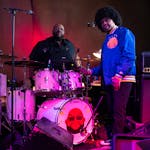It is one of the lesser-known myths of classical antiquity, and also one of the most morally questionable.
The princess Psyche enrages Venus, the Roman goddess of love, who is jealous of her beauty. Spitefully, Venus commands her son Cupid to make Psyche fall in love with a monster. Instead he falls for Psyche himself, but is only able to marry her when she has negotiated a series of difficult tests and trials.
In a #MeToo era sensitized to issues of gaslighting and the psychological abuse of women, Psyche's tale retains a chilling relevance. It is at the heart of "The Golden Ass," an "experimental opera" premiering this week at Nautilus Music-Theater in St. Paul.
Its composer, Tiffany Skidmore, has a longstanding fascination with the Psyche myth.
"It began when I read a book by C.S. Lewis called 'Till We Have Faces,' " she said. The Northern Irish writer's novel explores the Cupid and Psyche myth, and Skidmore found its tone and content captivating.
"Most people know Lewis' Narnia books, but this is nothing like that," she says. "The language of it is extremely poetic and sometimes very primitive. He makes you feel like you're in that time."
Skidmore teamed with librettist Patrick Gallagher to produce her own take on the myth, which homes in on Psyche's relationship with Cupid's envious mother Venus.
"One of the things I find really interesting about this myth is that it's the basis for 'Beauty and the Beast,' 'Cinderella' and other similar stories in western culture," Skidmore said.
"There's an underlying assumption that all the things that happen to Psyche are OK, because she ends up with Cupid. To me, that's a strange assumption, because she's essentially kidnapped by him and some of the trials she undergoes are terrible. Whether it's all worth it is a very important question."
A more visceral experience
So what is "experimental opera"? How does it differ from the staple operatic diet of Mozart, Verdi and Puccini?
"There are certain expectations when you hear the word 'opera,' " said the production's stage director, Joey Crane. "Experimental opera is the quickest way of saying that you might not get what you expect."
So instead of a traditional story line and clearly defined characters, expect something more impressionistic and shape-shifting in this production by the Twin Cities-based composer collective 113.
"There's a lot of abstraction in 'The Golden Ass,' " Skidmore said. "It's the sort of thing you'd be much more likely to see at the Walker Art Center than Minnesota Opera. It pushes beyond genre boundaries."
Much of the experimentation here involves the cast of six singers, spearheaded by the female vocal quartet Quince.
"There's a lot of taking the text and pulling it apart to look at it under a microscope, and the vocalism can be very guttural," Skidmore says. "The music is sometimes very nostalgic, sometimes very harsh. It's always connected to melody, and definitely lyrical. There are also dancers, and film elements where you see images connected to the narrative."
The abstract nature of "The Golden Ass" — in which communicating emotions is more important than spelling out the fine detail of plot development — means that Crane's role as director is different from what it would be in a more conventional opera.
"As a composer myself, my approach to the direction has been adding my own layer," said Crane. "I'm trying to get close to the emotional undercurrent of the narrative, but I also want the audience to find their own pathway through the work."
Crane's desire to, as he puts it, "open up the work" to listeners is central to his and Skidmore's view of what experimental opera is about.
"It's definitely a much more immersive experience than a typical opera," Skidmore says. "There are things happening all around the theater and the audience. It's an intimate space, and you can look in almost any direction and see something different."
At the same time, "The Golden Ass" is not a total break with tradition.
Skidmore acknowledges the umbilical tie that links it with pioneering experimental pieces like Philip Glass' 1976 opera "Einstein on the Beach," and with American innovators like Ives, Ruggles, Feldman, Reich and Carter.
"It's definitely on the American track as opposed to the European track," Skidmore said, referring to the rugged individualism that typifies much American classical music of the past century.
"So many people go to an opera with the expectation that they're going to get Mozart and be entertained," Crane said. "And when they go and get what they expected, that's the end of the experience. They go home and they don't think about it."
Experimental opera in general, and "The Golden Ass" in particular, are aiming to create a more visceral impression that provokes thought well after the final note has sounded.
"I think that any positive or negative reaction is valuable with this music," Crane said. "If you're surprised, shocked or even disappointed by 'The Golden Ass,' you're going to think about it longer and the piece will live with you longer. It's about being open to new experiences."
Terry Blain is a freelance classical music critic for the Star Tribune. Reach him at artsblain@gmail.com.






